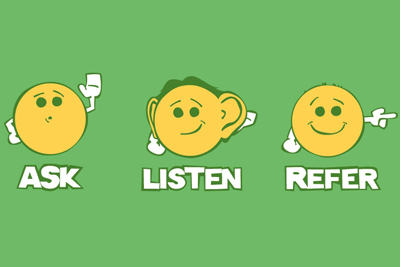
"Ask Listen Refer," an online, statewide suicide-prevention training program empowers bystanders to reach out and help someone who may be suicidal.
“It’s always better to ask.”
James Linsin, counseling psychologist at the University of Missouri–St. Louis, uses this short but powerful statement often. Linsin is talking about suicide prevention and what a student, faculty or staff member should know about it.
“What if I say the wrong thing?” “What if I do the wrong thing?” “If I ask, won’t that give my friend the idea to kill herself?” Linsin recites a list of “what ifs” well-meaning people use to avoid the difficult subject of suicide, the second leading cause of death among college students.
Linsin and the other counselors in University Health, Wellness, Counseling and Disability Access Services are hard at work promoting “Ask Listen Refer,” an online, statewide suicide prevention-training program. The tutorial takes 20 minutes to complete and is tailored to each of 29 participating Missouri colleges and universities. The program is funded by a federal grant through the Missouri Department of Mental Health.
“The idea behind the training is to empower bystanders to reach out and help someone who may be suicidal,” Linsin said. “It helps them recognize risk factors and warning signs of suicide and become more aware of what kind of help is available.”
It also debunks many of the myths surrounding suicide.
“Asking someone if they are considering suicide is a challenge and can lead to ‘what if’ thinking,” he said. “But asking is the best policy and ALR training will teach you how to do it.”
The tutorial also offers information on suicide among various cultures, statistics on high-risk groups and strategies on how to talk to a friend or colleague who may be considering suicide. Four short videos offer suggested dialogues. And it focuses on the three critical messages.
• ASK –If you are concerned at all that your friend could be suicidal, you must ask the question: “Are you thinking about hurting yourself?”
• LISTEN – Pay attention to your friend’s feelings and thoughts without judging. Reassure your friend that you care and are there to help.
• REFER – Take action. If your friend says they’re suicidal, get help immediately. Make the call. Help save their life.
“We often don’t trust our gut as much as we should,” Linsin added. “You may not know why it doesn’t feel right, but don’t be afraid to check it out.”
The ALR program was launched in August of 2009. Since that time, 245 people have completed the training at UMSL. Linsin would like to see that number increase substantially. They’ve just begun an incentive program. Complete the ALR training and you get a free cookie from the Nosh. Check Health, Wellness, Counseling and Disability Access Services for details.
Linsin encourages anyone with questions about counseling to call or drop by their offices, room 131 in the Millennium Student Center.
“There’s also lots of information on our website, which I think demystifies the process and tells you what to expect,” he said.
More information:
314-516-5711
umsl.edu/services/counser














